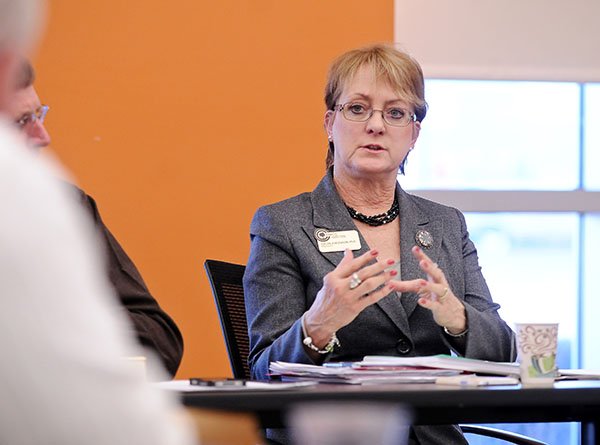BENTONVILLE — NorthWest Arkansas Community College will buy and remove a section of rail running through campus after the board agreed to a $2.5 million deal Friday.
The board voted 7-1 to buy a strip of land about 50 feet wide and 1 1/4 miles long owned by the Arkansas & Missouri Railroad. The rail spur runs parallel to Eagle Way from Water Tower Road west to the intersection of Southeast P and Southeast Eighth streets.
At A Glance
Acres, Appraisals
Reed & Associates of Fayetteville appraised the portion of railroad land to be purchased by NorthWest Arkansas Community College at $2.1 million. The purchase price was $2.5 million. The college will own 138.57 acres when the railroad purchase becomes official. That will bring the average cost per acre the college has paid for its land to $32,013, though the average appraised value per acre is $91,500.
Source: NorthWest Arkansas Community College
Trustees Scott Grigsby, Daniel Shewmaker, Mike Shupe, Geovanny Sarmiento, Amy Forrest, Mauricio Herrera and Joe Spivey voted for the deal. Todd Schwartz was the only trustee who opposed it.
The price includes removing rail, ties and signals, as well as leveling the land, though there’s no timetable yet for those things to happen.
“It’s a wonderful deal for the college,” said Evelyn Jorgenson, college president, after Friday’s board meeting.
About one-third of the land the college will buy is on campus. The total purchase amounts to about 9 1/2 acres.
Jorgenson said she has had “conversations” with Bentonville and Walmart about the portions outside campus, but she declined to go into further detail. She expressed confidence the college would be able to turn around and sell those portions.
The $2.5 million will come from the college’s debt service fund, which may be used to pay for capital projects. The college has about $5.7 million in that fund, said Debi Buckley, senior vice president for administration services and chief financial officer.
Schwartz said during Friday’s meeting he had talked to numerous people in the community about the railroad deal and he hadn’t met one who agreed with it.
In response, Jorgenson suggested most people probably don’t know all the details of the proposal, which was publicly discussed for the first time in November.
“I understand, but these are taxpayers,” Schwartz said. “I don’t think the public support is out there for this particular measure. But I definitely see why we want to do it.”
Jorgenson pushed for the deal mainly to improve the aesthetics and safety on campus. She also pointed out the only direction the campus can grow is north, and the railroad spur divides the north and south parts of campus.
“We’ve got to have a long-range view on this,” she said.
The administration originally presented the railroad proposal to the board in November, but the board declined to approve it then. Board members asked Jorgenson for more information about such things as the environmental impact and the feasibility of selling the land outside campus.
Environmental Enterprise Group did a study that found no evidence of troubling environmental conditions in connection with the property.
In the recent past, the railroad has used the spur to park rail cars, some of which have shown up on campus.
Spivey, who voted for the deal, said a student suspected of tampering with a railroad car could wind up in serious trouble.
“That’s a federal offense,” he said.
Spivey also recalled December 1976, when the railroad offered to sell the Frisco depot to Rogers. It gave the city a certain amount of time to consider the deal.
“At some point the railroad came in and hauled the depot off,” Spivey said. “I always remember that from my youth. It was on that day that Rogers lost a piece of its heritage it can never get back.”
Schwartz asked whether the college would be taxed on the property. Buckley said she believed as long as the land was used for an educational purpose, the college would not have to pay taxes on it.
Diana Nagel, president of the college’s faculty senate, encouraged the board to vote for the deal, citing research that shows a connection between student engagement and the quality of a school’s environment.

